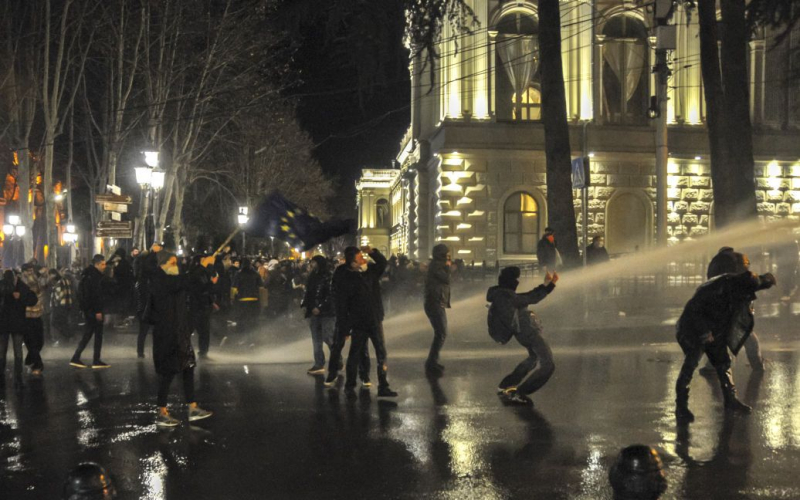
Thousands of people took to the streets of Tbilisi in support of the European course of Georgia.
On March 7, protests against the so-called “foreign agents law” stirred up Georgia. The opposition calls the law pro-Russian and directed against the European integration of the country. The protesters in Tbilisi were dispersed with water cannons, in response, the protesters threw Molotov cocktails. There are victims in the clashes, dozens of protesters were arrested.
What is happening in the capital of Georgia, why the scandalous law led to a political crisis and what does Russia have to do with it – details from TSN.ua.
Clashes in Tbilisi
In Tbilisi, on the morning of March 8, the protest action ended, but the participants promise to gather again soon.
The night before, in Tbilisi, thousands of people with flags of Georgia, the European Union and Ukraine went to a large-scale protest near the parliament building and blocked the central avenue. The protesters chanted “No to the Russian law!”.
The protesters also chanted the famous Ukrainian chant about Russian President Vladimir Putin.
Carefully! The video contains profanity!
During the rally, protesters clashed with the police. Law enforcement officers used water cannons, stun grenades and tear gas, and at least 66 protesters were detained.
The police say that the protesters used Molotov cocktails, pyrotechnics, threw stones at the building of the Ministry of Internal Affairs, and also set fire to official cars of the ministry. 50 policemen were injured.
Political crisis due to the “foreign agent law”
On March 7, the Georgian parliament adopted in the first reading a draft law on “foreign agents” that copies a similar Russian law. The document provides that the media and public organizations receiving funding from abroad will be given the status of “foreign agents”. In fact, the initiative is aimed at restricting the activities of human rights activists and the opposition press.
Consideration of the bill was accompanied by protests from the opposition and a fight between deputies in parliament.
The European Union said that the document is contrary to the conditions for obtaining EU membership. The US Embassy in Georgia called the adoption of this bill “a black day for Georgian democracy.”
Georgian Prime Minister Irakli Garibashvili spoke in support of the law on foreign agents and said that non-governmental organizations “fight against statehood and state interests.” He assured that Georgia is doing everything to obtain the status of a candidate for EU membership.
In turn, Georgian President Salome Zurabishvili was forced to change the program of her visit to the United States because of the vote for the “law on foreign agents”. Zurabishvili recorded an appeal to the citizens of Georgia against the backdrop of the Statue of Liberty in New York and promised that she would veto the law.
Several hundred Georgian non-governmental organizations and mass media have signed a statement against the adoption of a “law on foreign agents” in Georgia.
“This law aimed at civil society is only part of a larger picture, a larger anatomy of treason, our regime considers the West and the free world to be our enemy and is trying to cultivate this Putin idea by betraying the future of Georgia,” said Giga Bokeria , a member of the opposition European Georgia party. .
The Georgian opposition believes that the ruling Georgian Dream party, controlled by the oligarch Bidzina Ivanishvili, is acting contrary to national interests and undermining the movement towards Euro-Atlantic integration.
What the Georgian authorities are trying to achieve: expert opinion
Georgian political scientist Gela Vasadze said on the air of the all-Ukrainian telethon that the consideration of the scandalous bill is part of the war of the Russian Federation against the Western world.
“Let's be frank – the Russian Federation is at war against Ukraine, against the entire civilized world. What is happening now in Georgia is also part of this war… It's clear why this is being done. They are bargaining with the West: so that they have European integration, but also make money on Russia. Such is their Georgian Dream,” the political scientist explained.
Also, Gela Vasadze, in a commentary on the Freedom channel, said that the Georgian authorities have three main tasks when they pass this law :
“Mark 15 major non-governmental organizations involved in monitoring rights and freedoms in Georgia. Limit funding for opposition media from abroad, because it is almost impossible to find money for full-fledged media inside the country. And most importantly, the authorities create an excuse for themselves.” The adoption of this law will allow to tell them when Georgia is once again denied the EU candidacy – “look, we passed this law, but they didn’t let us in.” They don’t let us in not because of this, and not even because Saakashvili is dying today in in prison, but because there is a general regression in the sphere of democracy and freedom, and in the EU there is nothing to do without it.”
How Ukraine reacted to the protests in Tbilisi
The Ministry of Foreign Affairs of Ukraine is closely following the events in Tbilisi and supports the Georgian people in their European aspirations.
“We express our solidarity with the Georgian people in their desire to continue developing Georgia's European future,” the Foreign Ministry said in a statement.
The ministry also added that, as a state seeking to become a member of the European Union, Georgia must strictly guarantee citizens their fundamental rights and freedoms, in particular the right to peaceful protest.
“We also took into account the intention of Georgian President Salome Zurabishvili to veto the law on so-called “foreign agents”, which raises the activity of civil society. We share the position of the EU that the draft law in its current version is contrary to European values and standards,” the statement said. Ministry of Foreign Affairs of Ukraine.

